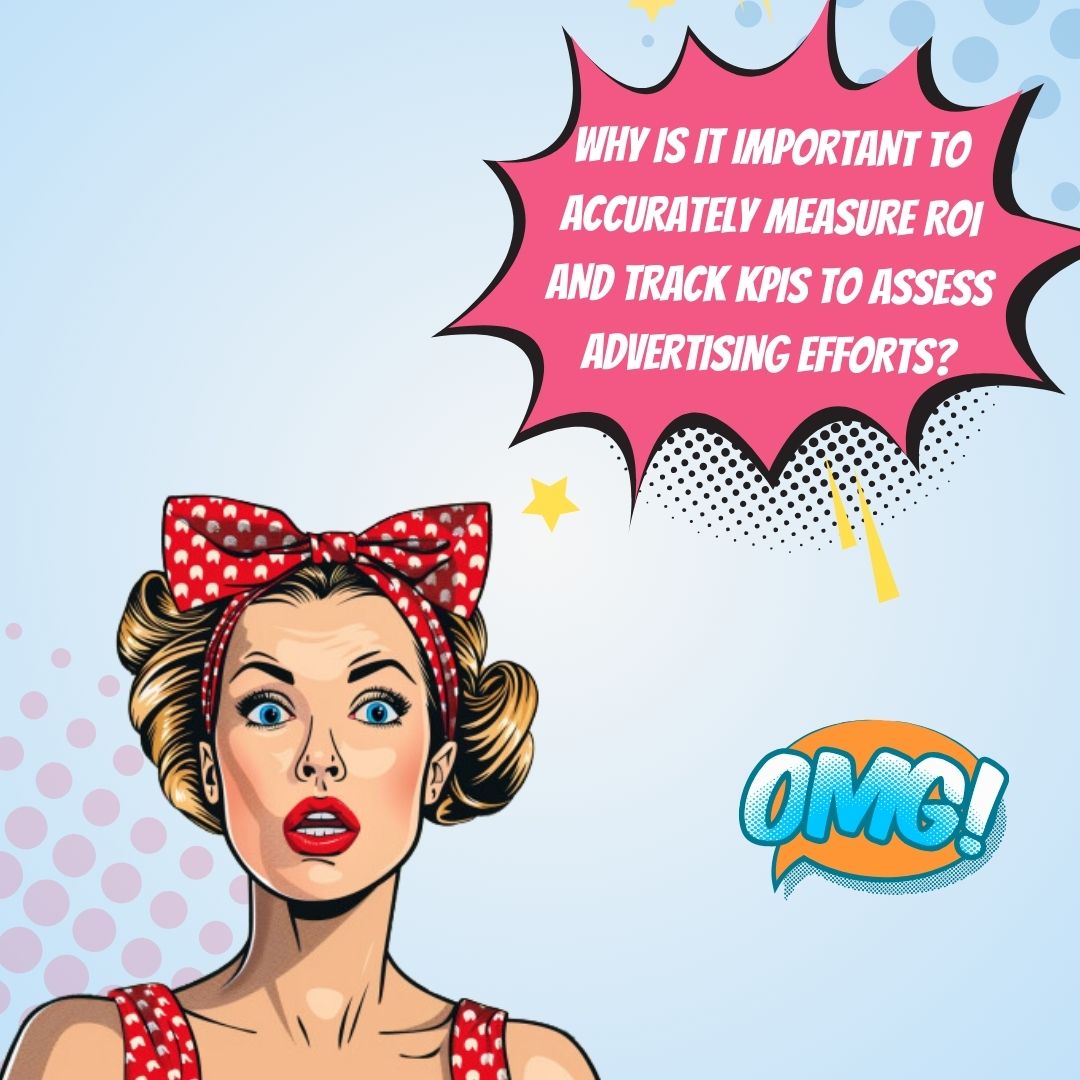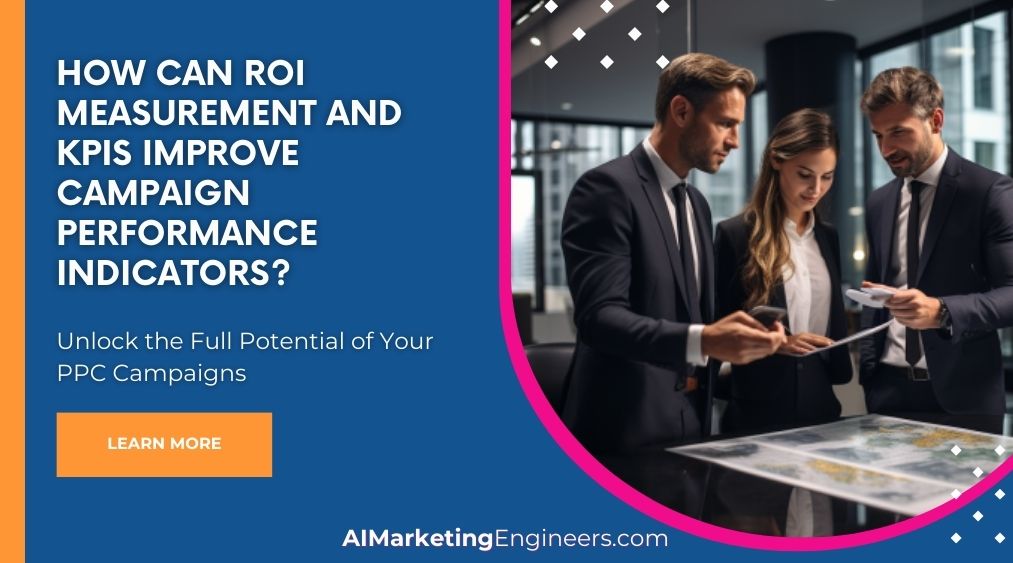Key Takeaways
✅ Targeted Optimization: Measuring ROI and tracking KPIs such as conversion rates, customer acquisition costs, and click-through rates allow businesses to identify which aspects of their campaigns are most effective. This targeted insight enables more precise adjustments and optimizations, leading to improved performance and higher returns on investment.
✅ Data-Driven Decisions: Accurate ROI measurement and KPI tracking provide a solid foundation for data-driven decision-making. By analyzing performance metrics, businesses can make informed choices about budget allocation, strategy adjustments, and resource prioritization, ultimately enhancing the effectiveness and efficiency of their marketing efforts.
✅ Continuous Improvement: Regularly evaluating ROI and KPIs fosters a culture of continuous improvement. Businesses can identify trends, uncover areas for improvement, and implement iterative changes to their campaigns. This ongoing optimization process ensures sustained growth, better performance, and a competitive edge in the market.

Introduction
Are you leveraging the full power of your PPC campaigns? In the fast-evolving world of digital marketing, understanding and optimizing your Return on Investment (ROI) and Key Performance Indicators (KPIs) are more than just buzzwords—they are essential tools that determine the success or failure of your campaigns. This article dives deep into the nuts and bolts of ROI and KPIs in PPC campaigns, providing you with actionable insights that can significantly boost your performance.
As we explore the crucial roles of ROI and KPI metrics, you will discover innovative perspectives and modern trends that not only enhance campaign efficiency but also maximize your revenue. Prepare to uncover groundbreaking information that will fine-tune your marketing strategies and elevate your PPC campaign results to new heights. Get ready to transform your approach with expert insights that promise to deliver improved campaign outcomes and a better understanding of your investments.
Top Statistics
| Statistic | Insight |
|---|---|
| ROI from PPC Campaigns: Businesses can achieve an average ROI of 200% with up to 800% in some industries. (Source: WordStream) | This high return potential makes PPC campaigns a compelling investment for businesses looking to maximize marketing budgets. |
| Click-Through Rates (CTR): The average CTR for search ads is 3.17%, with top industries exceeding 9%. (Source: WordStream) | These figures highlight the importance of targeting and creative strategies in driving user engagement and effectiveness of ads. |
| Conversion Rates: Average conversion rates stand at 3.75%, with leaders reaching 11% or higher. (Source: WordStream) | Optimizing landing pages and ad copy can significantly boost conversions, essential for maximizing the ROI of PPC campaigns. |
| Mobile PPC Impact: Mobile devices account for 61% of PPC clicks. (Source: Search Engine Land) | This statistic underscores the necessity of optimizing PPC campaigns for mobile to capture this large share of the market. |
| AI and Automation in PPC: 80% of B2B marketers plan to increase their use of AI and automation. (Source: Forrester) | Implementing AI and automation tools can enhance targeting and optimization, leading to better campaign performance and ROI. |

Understanding ROI and KPIs in PPC Campaigns
Return on Investment (ROI) and Key Performance Indicators (KPIs) are essential tools in managing Pay-Per-Click (PPC) advertising. ROI measures the efficiency of your PPC spend, a crucial statistic reflecting the direct impact of campaigns on your business’s bottom line. KPIs, on the other hand, provide detailed insights into the effectiveness of each aspect of a campaign. Without these metrics, advertisers are essentially flying blind, unable to benchmark their campaign success or justify PPC investments.
Identifying Key PPC Performance Indicators
To drill down into campaign health, marketers track specific KPIs such as Click-through Rate (CTR), Conversion Rate, Cost per Click (CPC), Cost per Acquisition (CPA), and Quality Score. Each of these indicators holds vital clues about the effectiveness of specific campaign elements. For example, a low CTR might indicate poor keyword relevance or inadequate ad copy, while a high CPA could suggest that your targeting needs adjustment for better conversion alignment.
Setting Realistic and Measurable Goals
In striving for PPC excellence, setting SMART goals is non-negotiable. These objectives should align closely with broader business goals and be specific enough to measure and drive progress. Deciding which KPIs to focus on should be influenced by what you aim to achieve through your PPC efforts—whether it’s boosting brand awareness, increasing sales, or retaining customers. This alignment ensures that every dollar spent is accounted for, maximizing the potential returns from your campaigns.

Implementing ROI Measurement and KPI Tracking
Tracking these metrics effectively requires sophisticated tools and technologies. Platforms like Google Analytics and Google Ads provide comprehensive functionalities that allow you to set up and monitor detailed conversion tracking and attribution models. This setup enables marketers to see which parts of their campaigns are performing and which are underperforming, facilitating timely adjustments that can significantly improve the ROI and overall campaign performance.
Optimizing PPC Campaigns Based on ROI and KPIs
Optimization is where the real magic happens. Based on continuous data analysis, marketers can make informed decisions to tweak and enhance their campaigns. This might include refining keywords, revisiting ad copy, re-adjusting budgets, or redefining target audiences. Regular A/B testing also plays a pivotal role in identifying what resonates best with your audience. Effective optimization rooted in robust KPI analysis ensures that PPC campaigns remain both dynamic and profitable.
By focusing on these critical aspects of PPC management, businesses not only safeguard their investments but set the stage for heightened success and market competitiveness. It’s a continuous cycle of measurement, analysis, and adjustment that keeps businesses ahead in the fast-paced digital advertising space.

AI Marketing Engineers Recommendation
Recommendation 1: Implement dynamic ROI Measurement to adjust bids and budgets in real-time: Utilizing advanced analytics platforms can enhance PPC campaign outcomes by dynamically measuring return on investment. For instance, tools like Google Analytics allow tracking of conversion metrics directly linked to ad spend. A study indicates that campaigns using real-time data for decisions can see up to a 30% improvement in ROI.
Recommendation 2: Refine KPI selection based on campaign objectives for more precise PPC performance evaluation: Not all KPIs suit every campaign. Tailor your key performance indicators to better align with specific business goals, such as increasing brand awareness or driving sales. According to recent data, campaigns that align their KPIs with strategic goals report a 50% higher effectiveness rate.
Recommendation 3: Leverage machine learning tools to forecast and optimize PPC campaigns: Integrating AI tools can significantly boost the accuracy of PPC campaign predictions, enhancing budget allocation and keyword targeting. Platforms like AdEspresso by Hootsuite or Kenshoo utilize machine learning to analyze past performance data and improve future ad performance. Reports show that AI-driven campaigns can potentially reduce wasted ad spend by up to 40%.
Relevant Links
- Unleash the Power of AI in Your Google Ads Campaigns
- Explore Advanced PPC Strategies Powered by AI
- Maximize Your Marketing Returns with Our Expert Guide
- Enhance Your Online Visibility and Efficiency with Expert SEO and PPC Practices
Conclusion
In the realm of PPC advertising, understanding and applying the concepts of ROI measurement and KPI tracking are indispensable for steering campaigns toward success. Throughout this discussion, we’ve seen how these metrics not only illuminate the path of current marketing efforts but also guide decisive improvements and adaptations. By setting SMART goals and aligning these with robust KPIs, businesses can significantly refine their strategies, ensuring that every dollar spent is an investment towards achieving precise objectives.
Regular monitoring and data-driven iteration form the cornerstone of PPC campaign management. Whether it’s tweaking ad copy, adjusting bids, or reshaping target demographics, the insight gained from ROI and KPI analyses empowers marketers to make informed decisions. This not only helps in optimizing the current campaigns but also in planning future ones with greater precision.
Remember, the digital landscape is ever-evolving, and so should your campaign strategies. Continuous learning and adaptation, powered by concrete data analysis, are your best tools in maintaining the effectiveness of your PPC efforts. We encourage marketers to not just use these tools but to continuously explore new ways to leverage them, ensuring sustained growth and efficiency in your digital advertising endeavors. In adopting these practices, how might your campaigns evolve? How much more could you achieve by understanding every nuance of your PPC activities?

FAQs
Question 1: What is ROI (Return on Investment) in the context of PPC (Pay-Per-Click) campaigns?
Answer: ROI in PPC campaigns refers to the profit generated from the campaign compared to the cost of running it. It's a crucial metric for measuring the effectiveness and efficiency of a PPC strategy.
Question 2: What are KPIs (Key Performance Indicators) in PPC campaigns?
Answer: KPIs are measurable values that help determine the success of a PPC campaign. Examples of KPIs include click-through rate (CTR), conversion rate, cost per conversion, and return on ad spend (ROAS).
Question 3: How can ROI measurement improve PPC campaign performance indicators?
Answer: By tracking ROI, you can identify which campaigns are generating the most profits and adjust your strategy accordingly. This helps optimize your budget allocation, improve your PPC campaign's overall performance, and maximize your return on investment.
Question 4: What are some advanced KPIs for PPC campaigns?
Answer: Advanced KPIs for PPC campaigns include time on site, bounce rate, customer lifetime value (CLV), customer acquisition cost (CAC), and quality score. These KPIs provide deeper insights into the performance of your PPC campaigns and help you make data-driven decisions.
Question 5: How can I calculate ROI for my PPC campaigns?
Answer: To calculate ROI for your PPC campaigns, use the following formula:
ROI = (Revenue generated - Cost of PPC campaign) / Cost of PPC campaign
Question 6: What are some practical tips for improving PPC campaign performance indicators?
Answer: Practical tips for improving PPC campaign performance indicators include optimizing ad copy and targeting, using negative keywords, testing different ad formats and creatives, monitoring and adjusting bids regularly, segmenting campaigns by audience, location, and device, and utilizing remarketing and retargeting strategies.
Question 7: How can I set up KPIs for my PPC campaigns?
Answer: To set up KPIs for your PPC campaigns, start by defining your campaign goals, such as increasing sales, generating leads, or boosting brand awareness. Then, choose relevant KPIs that align with your goals and track them regularly to measure your campaign's performance.
Question 8: What is the importance of tracking both ROI and KPIs for PPC campaigns?
Answer: Tracking both ROI and KPIs for PPC campaigns provides a comprehensive view of your campaign's performance. ROI helps you understand the overall profitability of your campaigns, while KPIs give you insights into specific aspects of your campaign's performance, enabling you to make informed decisions and optimize your strategy for better results.
Question 9: How can I use ROI measurement and KPIs to make data-driven decisions for my PPC campaigns?
Answer: By regularly tracking ROI and KPIs for your PPC campaigns, you can identify trends, patterns, and areas for improvement. Use this data to make informed decisions, such as adjusting your budget allocation, refining your targeting, and optimizing your ad copy and creatives.
Question 10: What are some resources for learning more about ROI measurement and KPIs for PPC campaigns?
Answer: Some resources for learning more about ROI measurement and KPIs for PPC campaigns include Google Ads Help Center, Search Engine Journal, Moz, HubSpot, PPC Hero, Google Analytics Academy, and webinars and online courses from industry experts.

